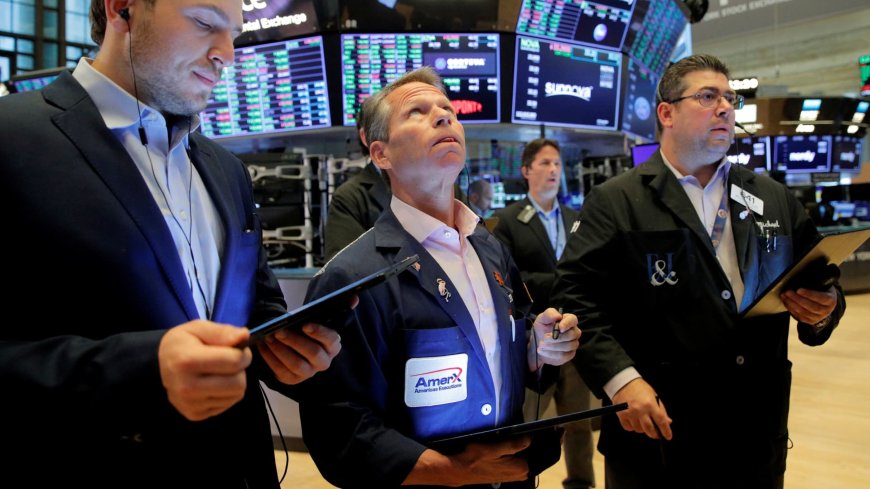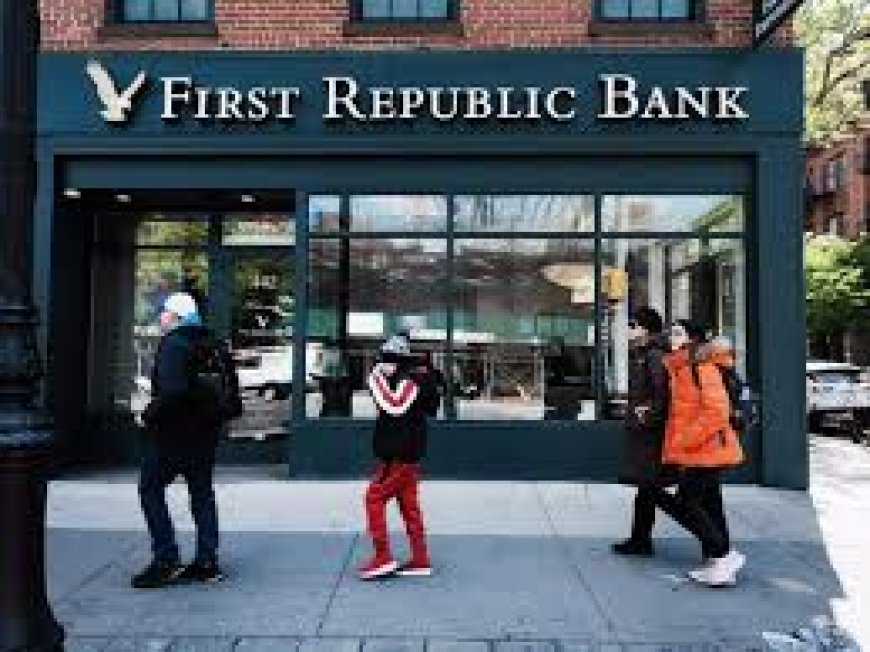Live Updates: Stay Informed on the Latest Trends in Stocks, GDP, and Banking Industry
Markets on High Alert: Banking Issues, Quarterly Earnings, and Economic Data Take Center Stage, stay updated with our live coverage.

Today's live coverage includes the following topics:
-
Wall Street closely monitoring the banking sector due to concerns over First Republic Bank's financial health.
-
Ongoing turbulence in the financial sector, including a debt ceiling standoff in Washington.
-
A plethora of economic data to be released, including weekly jobless claims, mortgage rates, and pending home sales, as well as the release of first-quarter GDP figures.
-
Several major companies are scheduled to release their quarterly earnings reports today, including Amazon, American Airlines, Samsung, Barclays, Unilever, Activision Blizzard, Southwest Airlines, Crocs, Hershey, Domino’s, MasterCard, Keurig, Dr. Pepper, Snap, Mondelez, Capital One, and T-Mobile.
-
Stay tuned for live updates and expert analysis on these latest developments.
Key Moments
- First Republic Bank's financial health is causing concern in the banking sector
- Turbulence in the financial sector due to a debt ceiling standoff in Washington
- Amazon, American Airlines, Samsung, and other major companies are releasing their quarterly earnings reports today
-
Survival Mode: First Republic Bank Faces Uncertain Future Amidst Banking Sector Woes
First Republic Bank is on the verge of collapse, with analysts warning of an imminent demise as the bank's total deposits fell 41% in Q1 and stock prices hit record lows. The bank has halted trading multiple times due to high volatility, and is reportedly exploring strategic options to find a potential buyer. Stay tuned for updates on the future of First Republic Bank and the wider impact on the banking sector.

-
US Debt Ceiling Drama: American Living Standards Hang in the Balance
Jockeying over raising the debt ceiling has become a recurring partisan ritual in Washington, but the consequences of a default would be devastating for American living standards. In the past decade, Congress has authorized trillions of dollars in spending, which has tripled the national debt since 2009. Raising the debt ceiling has become a routine but essential procedure as the Treasury Department borrows money to make payments on that debt. However, economists warn that not raising the debt ceiling could have catastrophic consequences, with up to one-tenth of all economic activity grinding to a halt, three million jobs lost, interest rates spiking, and even potentially killing almost a million jobs.
-
Market anticipates GDP report with stock gains
US stock futures rose as corporate earnings season continues to impress Wall Street, with tech earnings being a highlight. Meta's stock jumped 11% in pre-market trading after the company reported its first sales growth in nearly a year. However, sentiment is shifting on Wall Street, with investors becoming cautious in anticipation of a potential collapse of First Republic Bank. Additionally, markets will be keeping a close eye on economic reports for the day, with the First-quarter GDP expected to show that the US economic growth has slowed down. Meanwhile, weekly jobless claims could be on the rise again. The Dow, S&P 500, and Nasdaq futures were all higher. The Fear & Greed Index is currently at 51, indicating neutrality. In the oil and gas sector, US oil prices rose to $74 a barrel while average US gas prices fell to $3.64 a gallon.
-
Insights into First Republic Bank: What You Need to Know
After weeks of uncertainty, First Republic Bank could be next in line to collapse following in the footsteps of former competitors Silicon Valley Bank and Signature Bank. The San Francisco-based lender has a highly concentrated customer base, large amounts of uninsured deposits, and significant unrealized losses on its bonds and treasuries holdings. Speculation is rife that the bank is looking to cut a deal to sell assets, and the Federal Deposit Insurance Corporation is considering downgrading the bank's debt, which would limit its access to Federal Reserve loans. These reports have resulted in First Republic's shares falling by nearly 30% on Wednesday, after plunging by 49% on Tuesday. The stock's trading was halted numerous times both days due to volatility-triggered timeouts by the New York Stock Exchange. The FDIC, Federal Reserve, White House, and First Republic declined to comment on these rumors and reports.
Also Read: Bank Turmoil Results in $72 Billion Loss of Deposits for First Republic
-
US Economic Growth in Q1 Falls Below Expectations
The US Department of Commerce released its report on Thursday, revealing that the country's economy grew at an annualized and seasonally adjusted rate of 1.1% in the first quarter of this year. This is well below the expected 2% predicted by economists, and marks a significant slowdown compared to the previous two quarters. The report cited rising interest rates and high inflation as contributing factors to the sluggish growth, weighing down on both consumers and businesses alike. Despite this setback, experts remain optimistic about the long-term prospects of the US economy, particularly as the effects of the COVID-19 pandemic continue to wane.
-
New Unemployment Claims Decline: Weekly Figures Show 230,000 Jobless Claims
New claims for unemployment benefits declined for the week ended April 22, signaling a slightly improving job market. According to data released by the Department of Labor on Thursday, initial jobless claims totaled 230,000, a decrease of 16,000 from the previous week's upwardly revised figure of 246,000. This number was also lower than economists' consensus estimate of 248,000 on Refinitiv. Meanwhile, continuing claims, which represent individuals who have been unemployed for more than one week, unexpectedly fell to 1.858 million for the week ended April 15 from a revised 1.861 million in the previous week. The recent trend of rising weekly jobless claims, which reflects a softening in the US labor market, has raised concerns about mounting layoffs, but they still remain below the decade's pre-pandemic average of 311,000.




































































